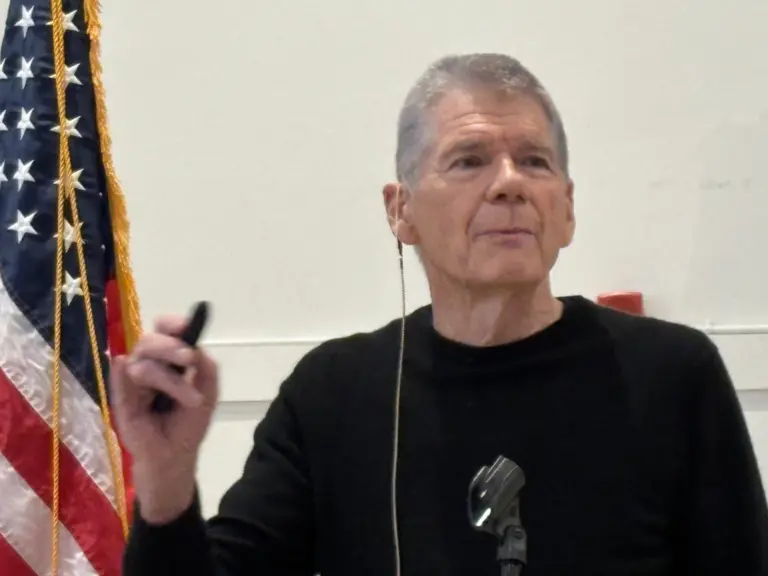By Nathan Hart
The University of Michigan football stadium can seat more than 110,000 fans. Its nickname is “The Big House” and it is one of the largest stadiums in the country. The unique characteristic of The Big House is that the stadium has no upper deck, no multiple tiers; it’s just one large bowl. You can look around the place and in one glance see the entire mass of humanity together at once. Simply walking into the stadium is a jaw-dropping experience.
I was in high school the first time I went to The Big House. A friend invited me to a fall football game. His dad had gotten seats close to the field near the end zone. At some point in the first half, Michigan was driving down the field. Every yard-gaining play brought them closer to our seats. From around the 15-yard-line, quarterback Brian Griese threw a pass to one of the receivers—I don’t recall his name—in the end zone just a few feet in front of our eyes. The whole stadium got quiet when Griese threw the pass. The ball hung in the air as we watched—all eyes on the receiver now—he caught it! Touchdown, Michigan! In an instant, the quiet was interrupted by a sound so loud it must be experienced to be believed. Suddenly, spontaneously, a hundred and ten thousand men, women, and children, erupted in unabashed joyful noise. I found myself joining the throngs. I couldn’t have helped if it tried. I screamed, I jumped to my feet, I raised my hands, I high-fived my friend, his dad, and two or three strangers behind us. We all kept smiling and cheering for another few minutes. We did it all again, although to a milder degree, when the extra point was good.
Here’s what I find interesting about that experience. We all did it. Nobody had to tell us how, when, or why. When we entered the stadium, there was no tutorial giving us the steps. (Can you imagine such a thing? “Okay everyone, listen up. If the QB throws the ball and the receiver catches it, you should do the following. Step 1: Stand up. Step 2: Raise your hands…”)
Why did everyone know what to do? Could it be because we were created to praise, that we are natural worshipers?
The word “worship” derives from the Old-English phrase “worth-ship.” When we value something, when we see its worth, we determine that it is worth-y of our admiration, time, and energy. In the Old Testament, the Hebrew word for worship is שָׁחָה, shāḥāh, which means “to depress,” or “to bow down,” “to prostrate.” The word is sometimes translated as a description of the physical act of bowing to the ground (as in Genesis 24:52) and sometimes as a heart posture of reverence (as in Exodus 4:31). The word Hallelujah (הַֽלְלוּ־יָהּ, halelū-yāh) means “to lift up” or “to praise” the name of God, Yahweh. With these two words, we see that worship is a two-part act: we bow down and we lift up. We humble ourselves and we exalt God.
In the New Testament, the Apostle Paul describes how sin twists people’s inherent posture for worship: “They exchanged the truth about God for a lie and worshiped and served the creature rather than the Creator.” (Romans 1:25). Paul shows us that we were designed by God to worship only him, but we tend to worship other things. There is an inherent feature within us that already knows how to worship. This fact is proven in Michigan Stadium and every other sporting event around the world. When we see something worthy of praise, we praise.
Yes, we know how to worship. But we become confused about what, or whom, to worship. One way we do this is by turning good things into ultimate things. Good things like pleasure, political causes, our kids’ success, or our public image, can become ultimate pursuits. When we make ordinary things into must-haves, we turn them into what the Bible calls idols, or what Tim Keller calls “counterfeit gods” in his book of that title. Counterfeit gods can never truly satisfy the human heart’s deepest longings; only God can do that. “If we look to some created thing to give us the meaning, hope, and happiness that only God himself can give, it will eventually fail to deliver and break our hearts,” writes Keller.
The touchdown pass from Brian Griese was praiseworthy, but when I left The Big House that day, I didn’t believe that Michigan Football could make my life complete. Some sports fans make this mistake, this mis-placing of worship, and their happiness rises and falls with the win-loss record of their favorite team.
And let’s also consider the athlete’s perspective. It would be a mistake for Brian Griese to place his identity in the roar of the crowd. That, too, cannot ultimately satisfy. (Interception!) Another quarterback from the state of Michigan, Kirk Cousins, is now the starting QB for the Minnesota Vikings. Cousins understands that his identity, his worth, does not depend on his athletic feats or the crowd’s praise. Referring to the need for a real, unmovable Savior, he said, “Football will one day end. And life will be based on much more than football.”
Because we were created to worship, we will always be praising, whether in a football stadium when there’s a great play, a dealership lot when we say “Wow” about a shiny new car, or in church when we sing heartily unto God. It’s not that we stop worshiping when we aren’t in church, it’s just that we’re often praising something else.
As creatures who are always tempted by sin to mis-place our worship, how can we reorient ourselves to praise the thing that will never disappoint?
Keller answers this question brilliantly: “The only way to free ourselves from the destructive influence of counterfeit gods is to turn back to the true one, the living God… he’s the only one who if you find him, can truly fulfill you, and if you fail him, can truly forgive you.”
This “turning back” is called repentance. We pray, “Lord, I confess that I’ve mis-placed my worship onto the things of this world. I turn away from them and toward you. I want to worship you only. Amen.”
In the 73rd Psalm in the Bible, the psalmist realized that “nothing on earth” was worthy of his praise. In prayer, he gazed upon his Savior and said, “Whom have I in heaven but you? There is nothing on earth that I desire besides you. My flesh and my heart may fail, but God is the strength of my heart and my portion forever.”
The shiny and shimmering things in this world may seem praise-worthy, but eventually they will disappoint. Brian Griese has grown older and can’t throw a TD pass like he used to. A new car eventually breaks down. The roar of the crowd fades. But as it says in Psalm 100, “The Lord is good; his steadfast love endures forever, and his faithfulness to all generations.”
According to the New Testament, heaven is full of people who choose Jesus as the object of their worship and find him worthy of all praise. Heaven’s throne is surrounded by something like, but infinitely more awesome, than the cheering fans at Michigan Stadium. In Heaven people look to Jesus and shout:
“Worthy are you, our Lord and God,
to receive glory and honor and power,
for you created all things,
and by your will they existed and were created.” (Revelation 4:11)
The Rev. Dr. Nathan Hart is the Senior Pastor of Stanwich Church.




